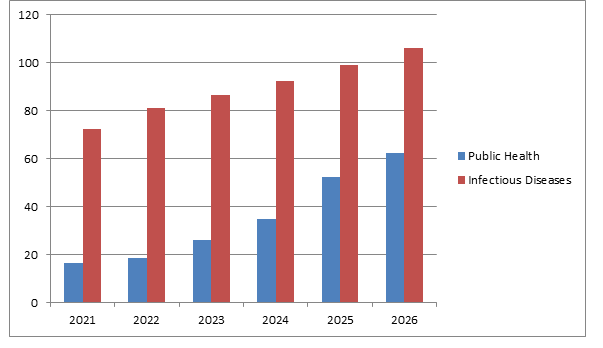Theme: Theme: Get into the whole field of exploring Epidemiology and Public Health
EPIDEMIOLOGY HEALTH MEET 2022
With great pleasure we welcome all the participants across the World to attend the “5th Annual Conference on Epidemiology and Public Health” going to be held on December 08-09, 2022, Paris, France.
This conference provides a firm platform for scientists, researchers, professors, engineers, and directors of various companies, industrial professionals, and students in the field of epidemiology, microbiology, virology, infectious diseases, and public health and other related fields to share their knowledge. We also take massive pleasure in welcoming various professionals from distinct countries all over the world.
EPIDEMIOLOGY HEALTH MEET 2022 is an international platform for building research works and therapeutic findings and disorders related to microbial diseases, viruses, and infections caused by bacteria, and fungi. These types of diseases may be caused due to water-borne, food-borne, and airborne in human beings as well as in plants and animals. When it comes to microbiology and virology the microbes are characterized as the heart for most of the solution of the pressing problems in the world. It also represents the increasing importance of human mortality around the globe; thereby vaccination and vaccine development play a significant role in terms of global health.
Why to attend?
Epidemiology Health Meet 2022 conference brings jointly experts, main researchers, scientists, scholars, professors from fields of Health care, Epidemiology, Physicians, Nutrition, Nurse practitioners and other related areas to interrelate and interchange ideas about the state of the art technologies related to Epidemiology and Public health. The conference will also produce an insightful understanding to the matter arising out of the Epidemiology and Public health and the future concern and treatment from that. Epidemiology Conference 2021 gives a chance to contact with researchers, Scientists, Business Leaders, experts from all over the world
Target Audience:
- Epidemiologists
- Researchers
- Health care experts
- Cardiologists
- Psychiatrists
- Nutritionists
- Nurse practitioners
- Healthcare analysts
- Doctors
- Physicians
- Business delegates
- Young Researchers
- Professionals in media sector
- Professors
- Industrial Experts
- Management Bodies
- Medical Colleges and Hospitals
- Decision Makers
- Academic & Business Professionals
- Students
- Scientists
- Medical and Pharma Companies
- Associations, Societies, & Professional Bodies
- Researchers & Innovators
- Sales & Marketing Professionals
Track 01: Epidemiology of Infections
Infectious Disease Epidemiology is a concise reference for practicing epidemiologists, as well as a thorough understanding of basic concepts critical to understanding specialist areas of infectious disease epidemiology for trainee readers. Infectious disease epidemiology is the practical science concerned with reducing the impact of the pathogens on public health. Because pathogens and their hosts have both evolved, growth in biology is important for understanding the nature of their interactions for fitness, as well as for resolving the history of pathogen transmission. Whereas molecular data can define strains and the genetic variation that serves as the raw material for natural selection. Recent advancements in the growth in biology, particularly in the rapid determination of sequence data, are bringing it closer to the clinic.
- Infection
-
Zoonotic diseases
Track 02: Cardiovascular Epidemiology
Cardiovascular diseases is the situation that affect your heart and blood vessels. Without suitable treatment, cardiovascular disease can lead to strokes or heart attacks. You can make lifestyle changes or take medications to be in charge of cardiovascular disease. The current vision of cardiovascular disease point up an ecological approach that incorporates the full range of biological, environmental, and social determinants of cardiovascular health across the life course. Major advances in the cardiovascular epidemiology over the last 4 decades have increased our understanding of the pathogenesis of CVD, with the identification and treatment of several major risk factors.
- Heart Failure
- Arrhythmia
- Congenital heart disease
Track03: Neuro-Psychiatric Epidemiology
Although neurology and psychiatric disorders account for 28% of global disease and disability burden, clinical expertise and research capacity to conduct meaningful assessments of common conditions such as epilepsy and post-infectious neuropsychiatric disorders are almost entirely concentrated in the United States and other developed countries. INPEP is committed to researching common neurologic and psychiatric disorders that have an impact on public health in low-income, developing countries around the world. Neurodevelopmental disabilities, HIV-related problems, cerebral malaria, and CNS infectious diseases are examples of such conditions, as are common psychiatric conditions such as anxiety, depression, or behavioural disorders, which may be more prevalent or have unique risk factors in these settings.
- Psychiatric illnesses.
- Alzheimer's Disease
Track 04: Nutritional Epidemiology
The study of dietary and nutritional factors in relation to disease occurrence at the population level is known as nutritional epidemiology. Nutritional epidemiology is a relatively new field of medical research that investigates the link between diet and health. It is a relatively new field of epidemiology that is becoming increasingly relevant to contemporary health concerns. Diet and physical activity are difficult to accurately measure, which may explain why nutrition has received less attention in epidemiology than other risk factors for disease. Nutritional epidemiology employs nutritional science knowledge to aid in the understanding of human nutrition and the explanation of fundamental underlying mechanisms.
- Health
- Foodborne Disease
Track 05: Pharmacoepidemiology
Pharmacoepidemiology is the study of drug utilisation and effects in large groups of people; it provides an estimate of the likelihood of beneficial effects of a drug in a population as well as the likelihood of adverse effects. It is a science that spans both clinical pharmacology and epidemiology. Pharmacoepidemiology benefits from general epidemiology methodology and may further develop it for applications of methodology specific to pharmacoepidemiology needs.
- Clinical pharmacology
- Drugs
Track 06: Reproductive, Perinatal and Pediatric Epidemiology
Pediatric and Perinatal Epidemiology is a peer-reviewed medical journal published bimonthly that covers epidemiologic research in pediatrics and perinatology. This area is concerned with the factors that influence health and disease in reproduction and childhood development. Many faculty members are experts in global maternal health and child development issues. Reproductive, perinatal, and pediatric health issues are among the most pressing issues of our time, both scientifically and politically.
- Maternal health
- Child development
Track 07: Chronic Disease Epidemiology
The chronic disease epidemiology unit conducts research on the aetiology, prevention, distribution, natural history, and treatment outcomes of chronic health conditions such as cancer (particularly breast, colon, lung, prostate, ovary and pancreas). A disease or condition that typically lasts three months or longer and may worsen over time. Chronic diseases are more common in older people and can usually be managed but not cured. Cancer, heart disease, stroke, diabetes, and arthritis are the most common types of chronic disease.
- High blood pressure
- Coronary heart disease
Track 08: Public Health Policy & Health management
The laws, regulations, actions, and decisions implemented within society to promote wellness and ensure that specific health goals are met are referred to as public health policy . Formal legislation to community outreach efforts are examples of public health policies. The field of public health policy management is critical not only for the government and health care industry sectors, but also for the general public. These professionals assist in the implementation of policies that ensure access to health care services, as well as in educating the public and improving health conditions.
- Public Health
- Health Policy
Track 09: Vaccines
Immunization is a global success story in terms of health and development, saving millions of lives each year. Vaccines reduce the risk of contracting a disease by enhancing your body's natural defenses. Your immune system reacts when you receive a vaccine. We now have vaccines to prevent over 20 potentially fatal diseases, allowing people of all ages to live longer, healthier lives. Immunization currently saves the lives of 2-3 million people each year from diseases such as diphtheria, tetanus, pertussis, influenza, and measles. Immunization is an essential component of primary health care and an inalienable human right. It's also one of the best health investments you can make with your money. Vaccines are also important in the prevention and control of infectious disease outbreaks.
- Covishield
- Covaxin
Track 10: Plant Disease Epidemiology
The study of disease in plant populations is known as plant disease epidemiology. Plant diseases , like human and animal diseases, are caused by pathogens such as bacteria, viruses, fungi, oomycetes, nematodes, phytoplasmas, protozoa, and parasitic plants. Plant disease epidemiologists work to understand the causes and effects of disease and to devise strategies to intervene when crop losses occur. Plant diseases are detected using both destructive and non-destructive methods. Understanding the immune system responses in plants will also help to benefit and limit crop loss. Depending on the crop value, successful intervention will usually result in a low enough level of disease to be acceptable.
- Bacteria
- Viruses
Track 11: Environmental Epidemiology
The study of disease distribution and environmental determinants is known as environmental epidemiology. This observational science is based on events that occur within human populations, known as natural experiments, from which inferences are drawn to identify disease causes. Environmental epidemiology is a branch of epidemiology that studies how environmental exposures affect human health . This field studies how various external risk factors can predispose to or protect against disease, illness, injury, developmental abnormalities, or death. These factors may occur naturally or be introduced into environments where people live, work, and play.
- Microbiological pathogens
- Abnormalities
Track 12: Genetic Epidemiology
Genetic epidemiology is a relatively new medical field that studies how genetic factors interact with the environment in the context of disease in populations. Among the topics being researched are the causes of inherited disease, as well as its distribution and control. The study of how genetic factors contribute to health and disease in families and populations, as well as how genes interact with environmental factors, is known as genetic epidemiology. The field of genetic epidemiology has made significant contributions to medicine and public health. The use of newborn screening to detect inherited disorders in offspring is one example.
- Human genetics
- Mycobacterium leprosy
Track 13: Molecular Pathological Epidemiology
Molecular pathological epidemiology (MPE, also known as molecular pathologic epidemiology) is a branch of epidemiology that combines pathology and epidemiology. It is defined as "epidemiology of molecular pathology and disease heterogeneity." Pathology and epidemiology share the same goal of elucidating disease aetiology, and MPE aims to accomplish this goal at the molecular, individual, and population levels. MPE typically makes use of tissue pathology resources and data from existing epidemiology studies. MPE and conventional-type molecular epidemiology using traditional disease designation systems are both included in the term "molecular epidemiology."
- Immunology
- Drug therapy
Track 14: Genetic Epidemiology and Statistical Genetics
The Program in Genetic Epidemiology and Statistical Genetics (PGSG), formerly known as the Program in Molecular and Genetic Epidemiology, is dedicated to the genetic analysis of complex human diseases. The study of how genetic factors contribute to health and disease in families and populations, as well as how genes interact with environmental factors, is known as genetic epidemiology. SPH statistical geneticists create statistical methods for understanding the genetic basis of human diseases and traits. Large-scale data sets from candidate-gene, genome-wide, and sequencing studies, involving both unrelated and related individuals, are used in these methods. SPH statistical geneticists collaborate with other SPH and international researchers on studies of cancer, heart disease, diabetes, respiratory disease, psychiatric disease, and health-related behaviours (e.g. smoking, diet).
Track 15: Clinical Epidemiology
The study of the patterns, causes, and effects of health and disease in patient populations, as well as the relationships between exposures or treatments and health outcomes, is known as clinical epidemiology. A clinical epidemiologist is a medical professional who studies disease and its spread. They primarily use research to improve clinical and patient-centered healthcare. They will work in labs and in the field, and they may be given a variety of responsibilities.
- Diagnosis
- Prognosis
Track 16: Psychiatric Epidemiology
The study of the causes (aetiology) of mental disorders in society, as well as the conceptualization and prevalence of mental illness, is the focus of psychiatric epidemiology. It is a subfield of the larger field of epidemiology. Its origins can be traced back to early twentieth-century sociological studies. While sociological exposures are still widely studied in psychiatric epidemiology, the field has since expanded to include the investigation of a wide range of environmental risk factors, such as major life events and genetic exposures. Neuroscientific techniques such as MRI are increasingly being used to investigate the mechanisms underlying how exposure to risk factors may impact psychological problems, as well as the neuroanatomical substrate underlying psychiatric disorders.
- Mental disorders
- Physical illness
Track 17: Women’s Health Epidemiology
Women's health can be examined using a variety of indicators that differ depending on geography, socioeconomic status, and culture. Multiple dimensions of well-being must be examined in comparison to global health averages as well as men in India in order to adequately improve women's health in India. Health is a critical factor that influences both human well-being and economic growth. Currently, women in India face a slew of health issues, which have a knock-on effect on the overall economy's output. Addressing gender, class, and ethnic disparities in healthcare and improving health outcomes can lead to economic gains through the creation of quality human capital and increased levels of savings and investment.
- Therapeutic drugs
- Gestational diabetes
Track 18: Emerging Infectious Diseases
Emerging infectious diseases are infectious diseases that have recently emerged in a population or that existed previously but are rapidly increasing in incidence or geographic range. Several factors contribute to the emergence and re-emergence of infectious diseases, but the majority can be linked to the increasing number of people living and moving on the planet: Rapid and intense international travel; overcrowding in cities with inadequate sanitation; and changes in the handling and processing of large amounts of food.
- Influenza
- Pneumococcal disease
Track 19: Epidemiology and Oral Health
Epidemiology in oral health is a growing field of scientific knowledge that can be used to combine clinical dental care models with optimal protocols. It also broadens discussions about oral pathologies and their relationship to biopsychosocial factors. Oral hygiene is the practise of keeping one's mouth clean and free of disease and other problems (such as bad breath) on a regular basis by brushing one's teeth (dental hygiene) and cleaning between the teeth. To prevent dental disease and bad breath, oral hygiene must be practised on a regular basis.
- Periodontal disease
- Etiology
Track 20: Medicine & Disease Control Epidemiology
Epidemiology is a branch of medicine that studies the distribution of disease in human populations and the factors that influence that distribution, primarily through the use of statistics. Epidemiology is the study of the "distribution and determinants" of diseases or disorders within groups of people, as well as the development of knowledge on how to prevent and control them.
- Paralytic disease
- Pseudomonas infections
5th Annual Conference on Epidemiology and Public Health welcome presenters, exhibitors, and attendees from everywhere the world to Osaka, Japan throughout May 18-19, 2022. The organizing committee is getting ready for AN appealing and informative conference program as well as lectures, workshops, symposia on a good class of topics, poster displays, young scientist forums, and numerous programs for participants from across the world. We tend to gracefully invite you to unite North American country at the planet Epidemiology and Public Health, wherever you'll have AN intelligible expertise with students from overseas. The Organizing Committee and every one attendee of EPIDEMIOLOGY HEALTH MEET 2022 trying forward to fulfill you at Osaka, Japan.
Conference Highlights:
- Epidemiology of Infections
- Cardiovascular Epidemiology
- Neuro-Psychiatric Epidemiology
- Nutritional Epidemiology
- Pharmacoepidemiology
- Reproductive, Perinatal and Pediatric Epidemiology
- Chronic Disease Epidemiology
- Public Health Policy & Health management
- Vaccines
- Plant disease epidemiology
- Environmental epidemiology
- Genetic epidemiology
- Molecular pathological epidemiology
- Genetic Epidemiology and Statistical Genetics
- Clinical Epidemiology
- Psychiatric Epidemiology
- WOMEN'S HEALTH EPIDEMIOLOGY
- Emerging Infectious Diseases:
- Epidemiology and Oral Health
- Medicine & Disease Control Epidemiology
Global Epidemiology Equipment Market:
The global epidemiology equipment market for infectious disease treatments should grow from USD 72.4 billion in 2021 to USD 106.3 billion by 2026, at compound annual growth rate (CAGR) of 8.0% during the forecast period. The market is expected to witness significant growth owing to increasing prevalence of degenerative diseases. Moreover, growing geriatric population is also expected to propel the market over the forecast period.
List of Epidemiology Hospitals in Japan:
- The University of Tokyo Hospital Tokyo
- St. Luke's International Hospital Tokyo
- Kurashiki Central Hospital Kurashiki
- Kyoto University Hospital Kyoto
- Osaka University Hospital
List of Epidemiology Hospitals around the World
- Mayo Clinic-Rochester
- Massachusetts General Hospital
- The Johns Hopkins Hospital
- Toronto General-University Health Network
- Stanford Health Care-Stanford Hospital
List of Epidemiology Universities in Japan
- Tohoku University
- Kyoto University
- University of Tsukuba
- Teikyo University
- Waseda University
- Osaka University
- Hokkaido University
- Keio University
List of Epidemiology Companies in Japan:
- Toyota Motor
- Mitsubishi UFJ Financial
- Mitsubishi Corp
- Mizuho Financial
- Softbank
- Sumitomo Mitsui Financial
- Dai-ichi Life Holdings
- Seven & I Holdings
- MS&AD Insurance Group Holdings
- Takeda Pharmaceutical
- Toshiba
Related Societies:
USA: Association of University Programs in Health Administration, Public health institutes in Las Vegas, Association of University Programs in Health Administration, Association for Middle Eastern Public Policy and Administration (AMEPPA), American Epidemiology Therapy Association, Federation of State Boards of Infectious Diseases, American Association of Yemeni Students and Professionals, Oregon Pioneer Association
Asia Pacific: Australasian Epidemiological Association (AEA), Epidemiological Association of Bangladesh (EPAB), Hong Kong Epidemiology Association, Japan Epidemiological Association (JEA), Asia Pacific Society of Infection Control, Asia Pacific Strategy for Emerging Diseases and Public Health.
Middle East: Middle East Fertility Society, Iranian Epidemiological Association (IrEA), Saudi Epidemiological Association (SEA ), Turkish Epidemiology Association, Cameroon Directorate for Combating Disease, Epidemics and Pandemics, Tunisian Environmental Exposure and Epidemiology Association (TEEEA).
EUROPE: Europe - International Epidemiological Association, The European Public Health Association, ISEE Europe Chapter - International Society for Environmental, European Society of Cardiology: Epidemiology and Prevention, European Public health Association, Epidemiology of COPD | European Respiratory Society.
Conference Highlights
- Epidemiology of Infections
- Cardiovascular Epidemiology
- Neuro-Psychiatric Epidemiology
- Nutritional Epidemiology
- Pharmacoepidemiology
- Reproductive, Perinatal and Pediatric Epidemiology
- Chronic Disease Epidemiology
- Public Health Policy & Health Management
- Vaccines
- Plant Disease Epidemiology
- Environmental Epidemiology
- Genetic Epidemiology
- Molecular Pathological Epidemiology
- Genetic Epidemiology and Statistical Genetics
- Clinical Epidemiology
- Psychiatric Epidemiology
- Emerging Infectious Diseases
- Women’s Health Epidemiology
- Epidemiology and Oral Health
- Medicine & Disease Control Epidemiology
To share your views and research, please click here to register for the Conference.
To Collaborate Scientific Professionals around the World
| Conference Date | August 10-11, 2022 | ||
| Sponsors & Exhibitors |
|
||
| Speaker Opportunity Closed | |||
| Poster Opportunity Closed | Click Here to View | ||
Useful Links
Special Issues
All accepted abstracts will be published in respective Our International Journals.
- Journal of Health Education Research & Development
- Journal of Community Medicine & Health Education
- Epidemiology: Open Access
Abstracts will be provided with Digital Object Identifier by






